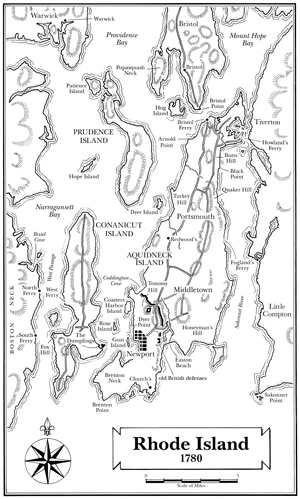Lieutenant General Rochambeau to George Washington, 29 October 1780
From Lieutenant General Rochambeau
Newport, 29th 8ber 1780
Sir
The Frigates and the person you know, set sail yesterday under a very strong North East wind. May Almighty God conduct them, and may they arrive safe at their destination.1 I believe that the English fleet that was before us is returned to Sandy-hook; There is no appearanc[e] of its having got into Gardner’s Bay, because the Ships that were Left there, according to the reports from New London, had set sail, the 26th inst. to Join them.2 A Flag that has brought here the prisoners of a Privateer that Carries Your Excellency’s name that has been taken by the Enemy eight days since, is commanded by the same Lieutenant of Arbuthnot that we had already seen.3 He has told us that Rodney was Labouring at New-york under the V——l. Distemper,4 that he waited for the Cork fleet to have salt provisions, and that he was after that to go back to the Leeward islands.5 The Governor Trumbull is very willing to receive at Lebanon Lauzun’s cavalry, and I expect to make him go there Directly.6 I am with respect Sir Your Excellency’s most obedient and humble servant
le Cte de Rochambeau
LS, DLC:GW; LB, in French, DLC: Rochambeau Papers, vol. 7; LB, in French, DLC: Rochambeau Papers, vol. 8. GW replied to Rochambeau on 4 November.
1. Rochambeau’s son and aide-de-camp vicomte de Rochambeau sailed for France in the Amazone on 28 October. That vessel and the escorting frigates Surveillante and Hermione narrowly escaped British pursuit (see Rochambeau to GW, 20 Nov.; the entry for 28 Oct. in , 43–44; and , 214; see also Rochambeau to GW, 5 Oct., n.2).
Donatien-Marie-Joseph de Vimeur, vicomte de Rochambeau (1755–1813), entered the French army in 1769 as a sub-lieutenant in the royal artillery corps and became mestre de camp en second of the Bourbonnais Regiment in January 1779. He returned

Map 1. Comfortably ensconced at Newport, Brigadier General Lauzun was forced by “scarcity of forage” to remove to “the forests of Connecticut,” which he likened to Siberia, for the winter of 1780–81. (Illustrated by Rick Britton. Copyright Rick Britton 2019)
2. Vice Adm. Marriot Arbuthnot’s fleet soon appeared in Gardiners Bay, N.Y. (see William Ledyard to GW, 28 Oct. 1780, found at Rochambeau to GW, 27 Oct., n.2, and Rochambeau to GW, 10 Nov.).
3. Lt. Josias Rogers transported prisoners taken from the privateer General Washington (see Christopher Greene to GW, 27 Oct., n.5, and Rochambeau to GW, 6 Sept. and 14 Nov.; see also William Heath to GW, 28 Aug.).
4. Rochambeau probably abbreviates “variole,” which is French for smallpox. New York City printer Hugh Gaine wrote in his journal entry for 14 Sept. that British admiral George Rodney was “ill with the Gout” (, 2:99).
5. Rodney’s fleet departed New York for the West Indies on 15 Nov., shortly after the arrival of a British supply fleet that came from Cork, Ireland (see GW to Francisco Rendon, 18 Nov., and Lafayette to GW, 14 Nov., and n.1 to that document).
6. Brigadier General Lauzun’s command left Newport on 9 Nov. and proceeded on 12 Nov. from Providence to winter quarters in Lebanon, Conn. (see Rochambeau to GW, 10 Nov., and , 75; see also Rochambeau to GW, 19 Oct., and the entry for 1 Nov. in French captain Berthier’s journal in , 1:236–37). Lauzun later recalled that “scarcity of forage obliged” Rochambeau “to send me to the forests of Connecticut. … As I spoke English I was charged with an infinite number of details, boring in the extreme, but necessary. I did not leave Newport without regrets; I had formed a very pleasant circle of acquaintance there.” He added: “Siberia alone can furnish any idea of Lebanon, which consists of a few huts scattered among vast forests” (, 194).
The Connecticut legislature had considered Rochambeau’s application to Gov. Jonathan Trumbull, Sr., and concluded: “This Legislature being desirous to provide all proper accommodations for our Allies, do upon entire perswasion that regular discipline will be observed by them hereby resolve, that the said Duke of Lawzun’s cavalry may be quartered in the towns of Windham, Lebanon and Colchester, or any of them.” Three men were designated “to provide suitable quarters for the officers and barracks for the men for said legion in all or any of the towns aforesaid” (, 3:187).

![University of Virginia Press [link will open in a new window] University of Virginia Press](/lib/media/rotunda-white-on-blue.png)
